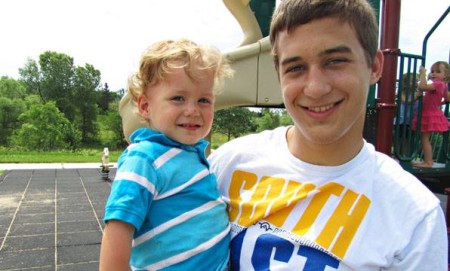I’ll admit I was shocked when I heard my son use the word “real” to talk about a biological relative. MY son. My beautiful seven year-old boy who had only ever heard adoption sensitive language in our home since he arrived here at 10 months-old. I read him the right books, answered all his questions, taught him the appropriate words to use for all members of the adoption triad (adoptee, adoptive parents, biological parents), and I was a passionate educator on adoption issues for everyone in his life. Where did this “real” word come from?
More than shocked, I think I was embarrassed. Josh was being dropped off at our home after school. I was standing in the driveway talking to the other mom about life and random parenting things and Josh was pulling on my sleeve. It was the usual dance of, “Mom!” “Just a second, Honey.” “MOM!” “Hang on. I need to finish this conversation.” And then he said, “Mom, I made a Valentine for my brother. My REAL brother. Can we send it to him?” I’m sure my face turned eight shades of red. I’m the one correcting everybody else’s language choices and here is my child referring to his biological brother as “real”. I could feel my friend looking at me and I felt the pressure to say the exact right adoptive mom thing to affirm that my son’s biological family is important, reiterate that WE are his family, and impress my friend with my total preparedness for any adoption related situation that would arise. But in my mind I was just thinking, “ARE YOU KIDDING ME? REAL?! And if you’re going to say the forbidden word, couldn’t you at least do it when we’re alone?” I know I fumbled through some sort of response about “Do you mean your BIOLOGICAL brother?” but it just didn’t feel right.

Photo by Rebecca Tredway Photography
My friend and I wrapped up our conversation and I took the kids into the house and asked Josh to sit with me. I pulled out the afternoon snack and he showed me the Valentine he made. I took a deep breath and asked Josh about his language choice from earlier. It was a good opportunity to talk about what it means to be “real”— that I don’t consider my biological child a real child and my adopted kids just pretend kids. Biology isn’t what makes our relationships real. By the end of the conversation I knew Josh understood and I haven’t heard him use the word since that day, but I’ve continued to think about that conversation.
There was a time when I believed your REAL mom was the woman who raised you. We’ve all heard, “Anyone can make a baby. It takes a real man to raise one.” Except that anyone can’t make a baby. For many years, we couldn’t. Our ability to become parents was dependent on someone else’s ability to make a baby and their choice to entrust us with that child’s care. So which one of us was the real parent?
Adoptive parents can be exceptionally sensitive to this word because we are faced with it in such a negative context. We hear it in questions that imply our relationship with our child isn’t as real as as it would be if we had birthed them— Do you know what happened to her real mom? Do you think she’ll want to find her real parents someday? Did his real mom not want him?— All these questions can be frustrating to hear when the implication is that we are the imaginary parents. The pretend parents. The less real.
So I’ve fought to be seen as real. I have corrected that language and reminded people that we prefer to say “biological parents” or ” birthparents” or “first parents”, but that I am the real mom. But the longer I am a real mom and the more secure I am in my children’s love for me, the less I feel the need to defend my realness. Of course it’s rude when people imply that the birthparents are the “real” parents, but in the intimate moments of conversation with my kids about their birth families, I have found myself explaining what I now believe is the truth- there is no one “real” mom.
. . . To finish reading, click over to Her View From Home. . .
